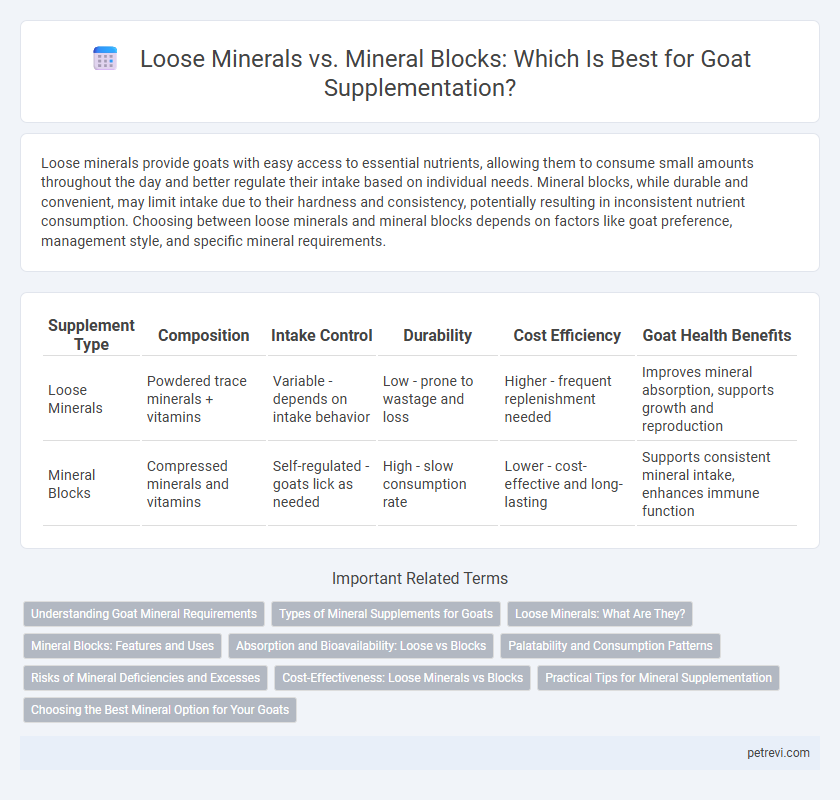Loose minerals provide goats with easy access to essential nutrients, allowing them to consume small amounts throughout the day and better regulate their intake based on individual needs. Mineral blocks, while durable and convenient, may limit intake due to their hardness and consistency, potentially resulting in inconsistent nutrient consumption. Choosing between loose minerals and mineral blocks depends on factors like goat preference, management style, and specific mineral requirements.
Table of Comparison
| Supplement Type | Composition | Intake Control | Durability | Cost Efficiency | Goat Health Benefits |
|---|---|---|---|---|---|
| Loose Minerals | Powdered trace minerals + vitamins | Variable - depends on intake behavior | Low - prone to wastage and loss | Higher - frequent replenishment needed | Improves mineral absorption, supports growth and reproduction |
| Mineral Blocks | Compressed minerals and vitamins | Self-regulated - goats lick as needed | High - slow consumption rate | Lower - cost-effective and long-lasting | Supports consistent mineral intake, enhances immune function |
Understanding Goat Mineral Requirements
Goats require a balanced intake of essential minerals such as calcium, phosphorus, magnesium, and trace elements like selenium and copper for optimal health and productivity. Loose mineral supplements provide goats with easier access and better variability in intake compared to mineral blocks, which can limit consumption due to texture and hardness. Monitoring goat mineral requirements through diet analysis ensures proper supplementation, preventing deficiencies that can lead to poor growth, reproduction issues, and weakened immunity.
Types of Mineral Supplements for Goats
Loose minerals for goats typically provide a customizable blend of essential nutrients like calcium, phosphorus, magnesium, and trace elements, promoting better absorption and higher intake control. Mineral blocks, often composed of salt, trace minerals, and sometimes medicated additives, offer a convenient, slow-release option but may result in variable consumption among goats. Selecting the right type depends on factors such as herd size, feeding management, and specific mineral deficiencies identified through soil and forage testing.
Loose Minerals: What Are They?
Loose minerals for goats are a form of dietary supplementation consisting of free-flowing mineral mixtures that animals can consume at will, providing essential nutrients such as calcium, phosphorus, magnesium, zinc, and selenium. These supplements promote optimal health, enhance immune function, and improve reproductive performance by ensuring goats receive balanced trace minerals tailored to their specific dietary needs. Compared to mineral blocks, loose minerals offer higher intake flexibility and better bioavailability, allowing goats to regulate consumption effectively based on their physiological demands.
Mineral Blocks: Features and Uses
Mineral blocks for goat supplementation provide a compact, long-lasting source of essential nutrients such as calcium, phosphorus, magnesium, and trace minerals like selenium and zinc, crucial for maintaining optimal health and productivity. These blocks are designed to withstand weather conditions, ensuring goats receive a steady intake of minerals through self-regulated licking, which supports bone development, immune function, and reproductive performance. Mineral blocks simplify feed management by reducing waste and offering a consistent mineral supply, especially in grazing systems where soil mineral content may be deficient.
Absorption and Bioavailability: Loose vs Blocks
Loose minerals offer higher absorption and bioavailability for goats compared to mineral blocks due to their greater solubility and ease of intake. Goats can selectively consume loose mineral mixtures, allowing for more efficient nutrient utilization and preventing underconsumption common with fixed-form mineral blocks. Studies demonstrate that loose minerals enhance mineral status more effectively, promoting optimal health and productivity in goats.
Palatability and Consumption Patterns
Loose minerals for goat supplementation generally offer higher palatability, promoting increased voluntary intake compared to mineral blocks. Goats tend to consume loose minerals more consistently due to their ease of access and ability to regulate intake according to their nutritional needs. Mineral blocks, while convenient and less waste-prone, often result in lower consumption rates because of reduced palatability and slower licking behavior.
Risks of Mineral Deficiencies and Excesses
Loose minerals allow precise individual dosing for goats, reducing risks of deficiencies such as copper or selenium that lead to poor growth and immune issues. Mineral blocks can limit intake variability but may cause overconsumption of elements like phosphorus or salt, resulting in toxicity or kidney damage. Balancing supplementation with loose minerals is essential to avoid the dangers of both mineral excesses and insufficiencies in goat health management.
Cost-Effectiveness: Loose Minerals vs Blocks
Loose minerals generally offer greater cost-effectiveness for goat supplementation due to their higher bioavailability and customizable intake, reducing waste compared to mineral blocks. Mineral blocks, while durable and easy to manage, often result in inconsistent consumption and higher overall costs per unit of nutrient absorbed. Selecting loose minerals can lead to more efficient nutrient utilization, enhancing goat health and productivity at a lower expense.
Practical Tips for Mineral Supplementation
Loose minerals offer goats more flexibility in intake, allowing them to self-regulate based on their individual needs, which enhances overall mineral absorption and health. Mineral blocks provide a slow-release source but may result in inconsistent consumption due to goats' varying licking behaviors and environmental conditions. For effective supplementation, place loose minerals in troughs to reduce waste and monitor intake regularly, while ensuring mineral blocks are kept clean and dry to maintain palatability and nutrient stability.
Choosing the Best Mineral Option for Your Goats
Loose minerals provide goats with highly bioavailable nutrients, promoting better absorption and improved overall health compared to mineral blocks. Mineral blocks offer convenience and reduced waste but may result in inconsistent intake, especially among dominant goats. For optimal mineral supplementation, choose loose minerals tailored to your goats' specific nutritional needs to ensure precise dosage and enhanced productivity.
Loose Minerals vs Mineral Blocks for Goat Supplementation Infographic

 petrevi.com
petrevi.com